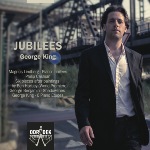- artist:George King
- featured artist:George King
- release year:2013
- style(s):20th Century, Contemporary
- country:United Kingdom
- formats:CD (Compact Disc)
- record posted by:Odradek Records
- label:Odradek Records
- buy this record
British pianist George King brings together a series of 21st century pieces, including the first recording of Philip Cashian’s Ben Hartley pieces and of his own piano etudes. In his search for the ‘new’ in music, as a Jazz and Classical composer/pianist, George shares with the listener the sheer pleasure of performing these pieces, always maintaining coherence and pianistic brilliancy, and shares the excitement of discovering great piano writing with challenging and very diverse original music.
---
Reviews:
“Beyond performing the score in a remarkably precise and focused way, your recording also shows a depth of understanding of the music for which I send you my warmest thanks and congratulations.”
George Benjamin 13 October 2013
---
“Perhaps better known for his jazz work, George King here offers a quartet of six-part suites of 21st-century solo piano music: testing compositions by Magnus Lindberg, Philip Cashian, George Benjamin and King himself. Lindberg's “Piano Jubilees” are short pieces unified by a balance between complexity and transparency, while Cashian's “Six pieces after paintings by Ben Hartley” brilliantly captures the quirky, naive spirit of the artist's work. Benjamin's “Shadowlines” offers a range of virtuoso techniques and stylings; as, too, does King's “6 Piano Études”, from the hypnotic tranquility of the 4th Étude and the Feldman- esque stillness of the 5th Étude to the writhing runs of the 6th Étude's torrential hubbub.”
The Independent Andy Gill 8 November 2013
---
“Here are four cycles of short. intelligently crafted and musically refined pieces. The six miniatures that make up Magnus Lindberg’s Piano Jubilees all exploit catchy short phrases that expand, contract and develop into unpredictable yet logical outcomes. For example, No 4’s simple, stark opening thirds unfold into darting lines, then return with faster, more line- orientated material. Composer/pianist George King's interpretations are a shade faster and geared more towards the ‘big picture’ than the more deliberate, close-up detail game plan of Ralph van Raat’s recording, and every hit as convincing.
As you'd guess from the title, Philip Cashian’s Six Pieces after Paintings by Ben Hartley are more descriptive than abstract. Several stand out: ‘Beware of the Twins‘ is a terse jig consisting of relentless double notes alternating between hands, and the opening ‘Cock-a-Dandy’ evokes the image of Messiaen's free-range aviary contained in a cuckoo clock.
I fail to hear the ‘epic’ qualities King ascribes to George Benjamin's Shadowlines, which are intimately scaled and carefully proportioned in terms of creating harmonic tension and resolution, wasting not one note. By contrast, King's own six piano études are less obviously original in that they readily reveal their influences — No 6’s rapid single lines and decorative flourishes suggest a Ligeti and Debussy étude mash- up - but they are well made and hold the attention. No 1's intense contrary-motion action concludes with a short and surprising single note. No 4 consists of haunting repeated phrases at differing soft dynamic levels joined by sparely deployed single notes and billowy chords that are similar to those of No 3, which anchor that etude‘s whimsical flourishes and repeated-note gestures.
No cause for complaint concerning the slightly dry engineering, although a warmer, more lustrous ambience might better offset the music’s leaner and more spacious qualities. Let's hope King follows up this worthwhile release with a disc that shows off his improvising acumen.”
Gramophone Jed Distler March 2014
---
If “preparing” a piano was, according to Berio, like "drawing a moustache on the Mona Lisa" (and doing this is in bad taste, at least for Berio and King, so forget Dadaism), what George King’s album Jubilees shows is that there are compositions for piano that do not require more mechanisms than those of the instrument itself. Let’s be honest: the beginning of the twentieth century and the present have been very generous with offering piano scores that are almost untouchable/ impossible to play (not because of virtuosity, but because of wealth of junk and annotations that are bordering on insanity), but through these four composers it becomes clear that not only is it possible to follow a line of "playable" pianistic literature, but also "audible".
Lindberg in his pieces has Debussy and Chopin in mind without camouflaging the virtuosic writing that may require an instrument he knows so well: his pieces are a sort of purification process, requiring careful listening to reach catharsis. Benjamin is denoted by the fascination of Messiaen’s harmony, with hidden, contrasting structures and surprising characters; the calm at the first and fifth piece against the aggressiveness of the second and the fourth, the playful third and the final piece with clear influences of the French master. Cashian experiments with what is already a classic; the dialogue between painting and music in a set of parts recreated in the paintings of Ben Hartley; some gouaches on cardboard of scenes of local customs with a certain naïve touch. Special music? Why not. But knowing where its inspiration comes from. In the case of George King and his studies, the references of classical music, jazz and improvisational style are mingled. The last piece (number six) requires great technical skill (certainly not impossible), that turns out to be trickster; the repeated notes and the rhythmic games of mad speed, asymmetric and accurate at the same time, bring reminiscences of Ligeti and leave the listener excited and captivated. A luxurious finale. A record showing that the piano (pure) is far from being exhausted. Check it for yourself. I assure you that it is worth it.
**** EXCELENTE - Ritmo Inés Ruiz Artola March 2014
---
Pianist George King brings together a series of 21st Century pieces. including the first recordings of Philip Cashian's Six pieces after paintings by Ben Hartley and of his own set of six Piano Etudes. These are highly-pleasurable readings of new music that take the pianist to new sonic boundaries.
Northern Echo Gavin Engelbrecht 27 March 2014



